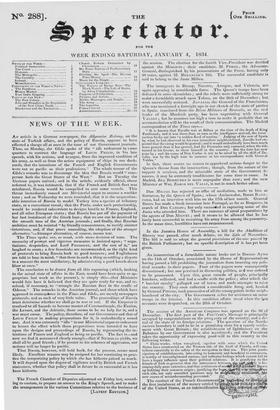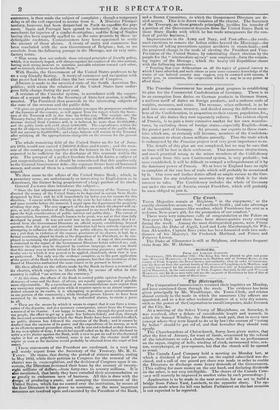The session of the American Congress was opened on the
3d of December. The first part of the Pres'ent's 'Message is principally occupied by congratulations on the prosrerity of the country, and a de- tail of the state of its foreign relations. The question of the North- eastern boundary is said to be in a promising state for a speedy settle- ment with Great Britain ; the establishment of lighthouses on the Bahamas by our Government is also mentioned; and the President takes the opportunity of expressing good-will to this country in the following terms.
" These works, when completed, together with some which the United States have constructed on the Western side of the Gulf of Florida, will con- tribute essentially to the safety of the navigation in that sea. This joint parti- cipation of establishments, inteiesting to humanity and beneficial to commerce, is worthy of two enlightened nations, and indicates feelings which cannot fail to have a happy influence upon their political relations. It is gratify ing to the
friends of both to perceive that the intercourse betwee le is be. coating daily more extensive, and that sentiments of mu vii up befitting their common origin ; justifying the ho a
each side, not only unsettled questions may be IttFat new causes of misunderstanding prevented.'
The conduct of the French Government g to. grst
the first instalment of the money settled by ffthisiiti of the United States, as an indemnification commerce, is then made the subject of complaint ' • though a temporary delay is all the evil expected to accrue from it. A Minister Plenipo-
tentiary, however, had been despatched to Paris to expedite the pay-
ment. Spain and Portugal have agreed to indemnify the American merchants for injuries of a similar description ; asulthe King of Naples having also been urgently applied to on the same grounds ny these in- defatigable creditors, Commissioners have been appointed to settle the amount of these claims. A treaty of amity and commerce has been concluded with the new Government of Belgium ; but, as we conclude from the following passage in the Message, not on very satis- factory terms.
" That treaty does not embody those enlarged principles of friendly policy, which, it is sincerely hoped, will always regulate the conduct of the two nations, having such strong motives to maintain amicable relations toward each other, and so sincerely desirous to cherish them."
With Russia, the Government of the United States professes to be on a very friendly footing. A treaty of commerce and navigation with that po.ver had been ratified since the last session of Congress.
Allusion is made to the unsettled state of the South American Re- publics; with whom the relations of the United States have under- gone little change during the past year. A revision of the Consular system, in accordance with the sugges- tions of a report made by the Secretary of State last session, is redbm- mended. The President then proceeds to the interesting subjects of the state of the revenue and the public debt.
" It gives me great pleasure to congratulate you upon the proaperous condition of the finances of the country, as will appear from the report which the Seem. tar)' of the Treasury will in due time lay before yon. The receipts into the Treasury during this year will amount to more than 3'2,000,000 of dollars. The revenue derived from Customs will, it is believed, be more than 2+4,000,000 ; and the public lands will yield about 3,000,(X)0. The expenditures within the year for all objects, including 2,572,24o of dollars, on account of the public debt, will not amount to 25,000,600; and a large balance will remain in the Treasuly after satisfying all the appropriations chargeable on the revenue for the present year."
The whole remaining debt of the United States on the hat of Janu- ary 1834, would not exceed 4,760,082 dollars and 8 cents ; and the reve- nue of the coming year, together with the balance in the Treasury, was expected to be sufficient for the discharge of this remnant within the year. The prospect of a perfect freedom from debt forms a subject of just congratulation ; but it should be remembered that this applies only to the General Government debt—the separate States have all borrowed money. and some of them to a considerable amount, which still remains unpaid.
We then come to the affairs of the United States Bank which, in a pecuniary sense, are unfortunately as interesting to Englishmen as to Americans, the former being proprietors of a large portion of its stock.
General JACKSON thus introduces the subject-
" Since the last adjournment of Congress, the Secretary of the Treasury has directed the money of the United States to be deposited in certain State Banks designated by him ; and he will immediately lay before you his reasons for this direction. I concur with him entirely in the view he has taken of the subject ; and some months before the removal, I urged upon the department the propriety of taking that step. The near approach of the day on which the charter will ex- pire, as well as the conduct of the Bank, appeared to me to call for this measure, upon the high considerations of public interest and public duty. The extent of its misconduct, however, although known to be great, was not at that time fully developed by proof. It was not until late in the month of August, that I re. ceived front the Government Directors an official report, establishing, beyond question, that this great and powerful institution had been actively engaged in attempting to influence the elections of the public officers, by means of its mo- ney; and that, in violation of the express provisions of its charter, it had, by a formal resolution, placed its funds at the disposition of its President, to be em- ployed in sustaining the political power of the Bank. A copy of this resolution as contained in the report of the Government Directors before referred to ; and, however the object may he disguised by cautious language, no one can doubt that this money was in truth intended for electioneering purposes ; and the par- ticular uses to which it was proved to be applied, abundantly show that it was so understood. Not only was the evidence complete, as to the past application of the power of the Rank to electioneering purposes, but that the resolution of the Board of Directors authorized the same course to be pursued in future."
Ile then alludes to the efforts made by the Bank to force a renewal of its charter, which expires in March 1836, by means of what in this country is called "an action on the currency."
• At dila time, the efforts of the Bank to control public opinion through the distresses of sonic and the fears of others, are equally apparent, and if possible more objectionable. By a curtailment of its accommodations more urgent than any emergency requires, and even while it requires specie to an almost unprece- dented amount in Its vaults, it is attempting to produce great embarrassment in one portion of the community ; while through presses known to have been sustained by its money, it attempts, by unfounded alarms, to create a panic in all. • These are the means by which it seems to eipect that it can force a resto- ration of the deposits, and as a necessary consequence, extort from the Congeess a renewal of its charter. I am happy to know, that, through the good sense of our people, the effort to get up a panic has hitherto failed; and that, through the Increased accommodation which the State Banks have been enabled to afford, no public distress has followed the exertions of the Bank ; and it cannot be doubted that the exercise of its power and the expenditure of its money, as well as its efforts to spread groundless alarm, will be met and rebuked as they deserve. In may own sphere of duty, I should feel myself called on by the facts disclosed to order a :vire facias against the Bank, with a view to put an end to the chartered rights it has so palpably violated, were it not that the charter itself will expire as soon as the decision would probably be obtained from the court of last resort. '
These statements of the President are confirmed, in a very long and wordy report from the Secretary of the Treasury, Mr. R. G. TANEY. He states, that during the period of sixteen months' ending in May 183.2, while their petition to Congress for the renewal of the charter was in contemplation, and the decision of Congress upon it un- certain, the Directors increased their loans by the amount of twenty- eight millions of dollars—from forty-two to seventy millions. It is also mentioned, that lately they have curtailed their accommodation so as greatly to embarrass men of business. All this is done with the design of producing a panic, and annoying the Government of the United States, which has no control over the institution, by means of the four Directors it has power to nominate, as the more important measures are resolved upon and executed by the President of the Bank, and a Secret Committee, to which the Government Directors are de- nied access. This is in direct violation of the charter. The Secretary of the Treasury, on these grounds principally, justifies his transfer of a portion of the Government deposits from the United States Bank to those State Banks with which he has made arrangments for the con- duct of public business.' Improvements in the Army and Navy, and Post-office—the conti- nued exertions to remove the Indian tribes beyond the Missisippi—the necessity of taking precautions against accidents in steam-boats—and the proposed change in the mode of electing the President and Vice- President of the United States, by substituting direct election by the people for the "intermediate agency" now employed—form the remain- ing topics of the Message ; which the hearty old Republican closes
with the following sentence— ,
" Trusting that your deliberations on all the topics of general interest to which I have adverted, and such others as your more extensive knowledge of the wants of our beloved country may suggest, may he crowned with success, I tender you, in conclusion, the cooperation which it may be in my power to afford them."























 Previous page
Previous page